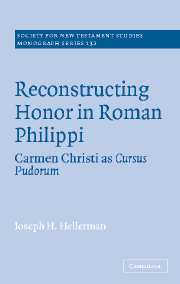Book contents
- Frontmatter
- Contents
- Acknowledgments
- List of abbreviations
- Introduction
- 1 Roman social organization
- 2 Preoccupation with honor and the cursus honorum
- 3 The Roman colony at Philippi
- 4 Honor and status in Philippi
- 5 Acts and Philippians
- 6 Carmen Christi as cursus pudorum
- 7 Summary and conclusion
- Notes
- References
- Index of ancient sources
- Index of modern authors
- Subject index
2 - Preoccupation with honor and the cursus honorum
Published online by Cambridge University Press: 22 September 2009
- Frontmatter
- Contents
- Acknowledgments
- List of abbreviations
- Introduction
- 1 Roman social organization
- 2 Preoccupation with honor and the cursus honorum
- 3 The Roman colony at Philippi
- 4 Honor and status in Philippi
- 5 Acts and Philippians
- 6 Carmen Christi as cursus pudorum
- 7 Summary and conclusion
- Notes
- References
- Index of ancient sources
- Index of modern authors
- Subject index
Summary
To be equal to others in liberty, and first in honour.
Cicero (Phil. 1.34)“The man who gains fair renown departs laden with blessings” (Or. 29.21); so wrote Dio Chrysostom of a non-elite boxer who had become quite famous for his skill in the ring but who died at an unfortunately young age. Jon Lendon, two millennia removed from Dio's world, but properly sensitive to Roman social values, paints a remarkably similar picture of relational priorities at the opposite end of the social hierarchy: “Aristocratic life often appears to us as a ceaseless, restless quest for distinction in the eyes of one's peers and of posterity.”
The present chapter focuses upon the insatiable desire for public esteem and recognition which characterized the social lives of males in every stratum of Roman society. I will first consider the place of honor in the hierarchy of values and briefly delineate the elements of honor as understood by the ancients. The balance of the chapter examines Rome's cursus honorum, or “sequence of offices,” which functioned as the standard political and social career for the Roman senatorial elite. Special attention will be given to the replication of the cursus in non-elite settings throughout the empire. As we shall see, at every turn “the struggle for reputation” (ὁ περὶ τῆς δόξης ἀγών), as Dio graphically expressed it, served as a primary source of social energy for public service and office-seeking in Rome and in the provinces (Or. 66.18).
- Type
- Chapter
- Information
- Reconstructing Honor in Roman PhilippiCarmen Christi as Cursus Pudorum, pp. 34 - 63Publisher: Cambridge University PressPrint publication year: 2005



